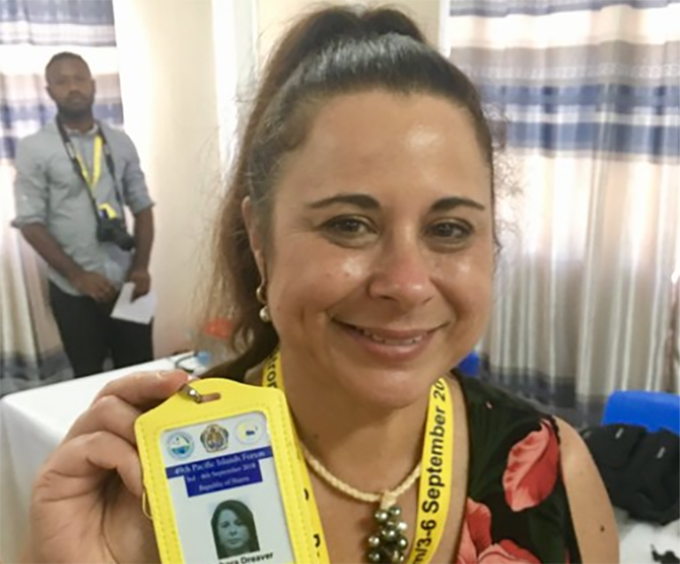
Climate change is a major worry to the Pacific Islands and it was the major talking point at the Pacific Islands Forum (PIF) earlier this month. Barbara Dreaver of Television New Zealand, who was detained and questioned in Nauru, talks to Sri Krishnamurthi of Asia-Pacific Report.
Two significant events happened at the 49th Pacific Islands Forum (PIF) earlier this month – climate change and ratification of the Boe agreement (a regional security pact that succeeded the 2000 Biketawa agreement), says Barbara Dreaver, a veteran journalist with 20 years’ experience covering the Pacific.
Dreaver made headlines herself by being detained and questioned for four hours after interviewing an asylum seeker from a detention centre on Nauru.
The centres were declared a forbidden area when Nauru approved journalists’ accreditation for the forum on September 3-6.

READ MORE: Climate change, at the frontlines
Initially, Nauru revoked Dreaver’s accreditation but reinstated it, so she could cover the forum proper, and she did not allow it to detract from doing her job.
Climate change is a growing burden for the Pacific and was the key discussion point at the forum.
Central to this is the demand by the Pacific Island countries that the United States return to the Paris climate agreement of 2015.
In short, the Paris Agreement is an ambition to keep the increase in global average temperature to well below 2 °C – and to limit the increase to 1.5 °C – as called for by the smaller island states at the forum.
Plea to the US
“Pacific leaders have also called on the US to return to the Paris agreement,” says Barbara Dreaver.
The call comes on the back of US President Donald Trump announcing his intention in June 2017 to withdraw. Under the agreement, the earliest possible withdrawal date for the US is November 2020, although moves have been afoot for the US administration to withdraw from the agreement.
Climate change has become such an important problem for Pacific Island nations that it had to take centre stage at the forum.
“Yes, this was the main thrust of the forum. The leaders have formally requested the United Nations appoint a special adviser on climate change and security and they have also called on the UN Security Council to appoint a special rapporteur to produce a regular review of global, regional and national security threats caused by climate change,” Dreaver told Asia Pacific Report.
Most of the controversy at the forum centred around Nauru, which was once a phosphate-mining mecca now virtually stripped dry and reduced to playing an off-shore role as a detention centre for asylum seekers to Australia.
Nauru is set to receive nearly A$26 million from Australia in Official Development Assistance in 2018-19, which is almost a quarter of its gross domestic product.
“The money Nauru receives from Australia is valuable to this cash-strapped nation. It’s not only in cash terms – buildings have been improved etc. For Nauru, while it’s a headache, it’s also a godsend,” says Dreaver.
Sensitive refugee discussions
Sensitive discussions around the detainees did take place under muted conditions and away from the media, she noted.
“The discussion around the detainees on Nauru took place in the bilaterals and only at a general level.
“There was some sensitivity given it’s a domestic issue for the most part and Nauru had made it clear it did not consider it part of the forum – even if others did.
“It should be noted that the bigger non-government organisations like World Vision or Amnesty, which would have brought up the issue at side events [civil society discussions)] were refused visas to Nauru.”
Incarcerated children on the island, kept in conditions widely considered inhumane, hardly rated a mention at the forum.
“The children on Nauru are staying put – I understand there are now approximately 109 of them,” says Dreaver.
An Australian decision
New Zealand did discuss the potential resettlement of some of the asylum seekers but were told it was an Australian decision.
“Jacinda Ardern (Prime Minister) discussed it with Nauru at the bilateral discussions but at the end of the day, if Australia doesn’t agree with the transferral of refugees to NZ it won’t happen. The decision is not the Nauru governments’ to make,” says Dreaver.
That was not to say New Zealand did not have a contribution to make at the PIF, even though one commentator in New Zealand likened Pacific countries to “leeches”.
“Most of New Zealand’s contribution was behind the scenes. For example, like some of the other member countries it had input on the Biketawa Plus or Boe Declaration,” she said.
“New Zealand’s presence must not be underestimated… the only times a New Zealand Prime Minister has not attended a forum has been when it has been close to an election.
“While fellow leaders have always publicly expressed their understanding, they have also made it clear New Zealand is missed and it doesn’t go down well.
“New Zealand is strong on fisheries in the region and its input in this area is strong,” she says on a food source that is dear to the heart of all Pacific Islanders.
Climate change priority
Again, there was no getting away from climate change and the security of the region, as Dreaver points out.
“Yes, the Boe declaration was ratified (named Boe as this is name of the President of Nauru’s [Baron Waqa] village where it was signed).
“The leaders had to go back to the table in the evening as Australia had some concerns over the language about climate change which other leaders describe as the single greatest threat to the region.
“There is a strong agreement for resources for cash-strapped nations, particularly in the area of cybercrime – it’s expected New Zealand and Australia will provide specialist and technical knowledge to help small island nations combat this,’’ Dreaver says.
Progress was made at the 49th sitting of the Pacific Islands Forum despite it being held in the controversial venue of Nauru.
Sri Krishnamurthi is a journalist and Postgraduate Diploma in Communication Studies student at Auckland University of Technology. He is attached to the University of the South Pacific’s Journalism Programme, filing for USP’s Wansolwara News and the AUT Pacific Media Centre’s Asia Pacific Report.






































